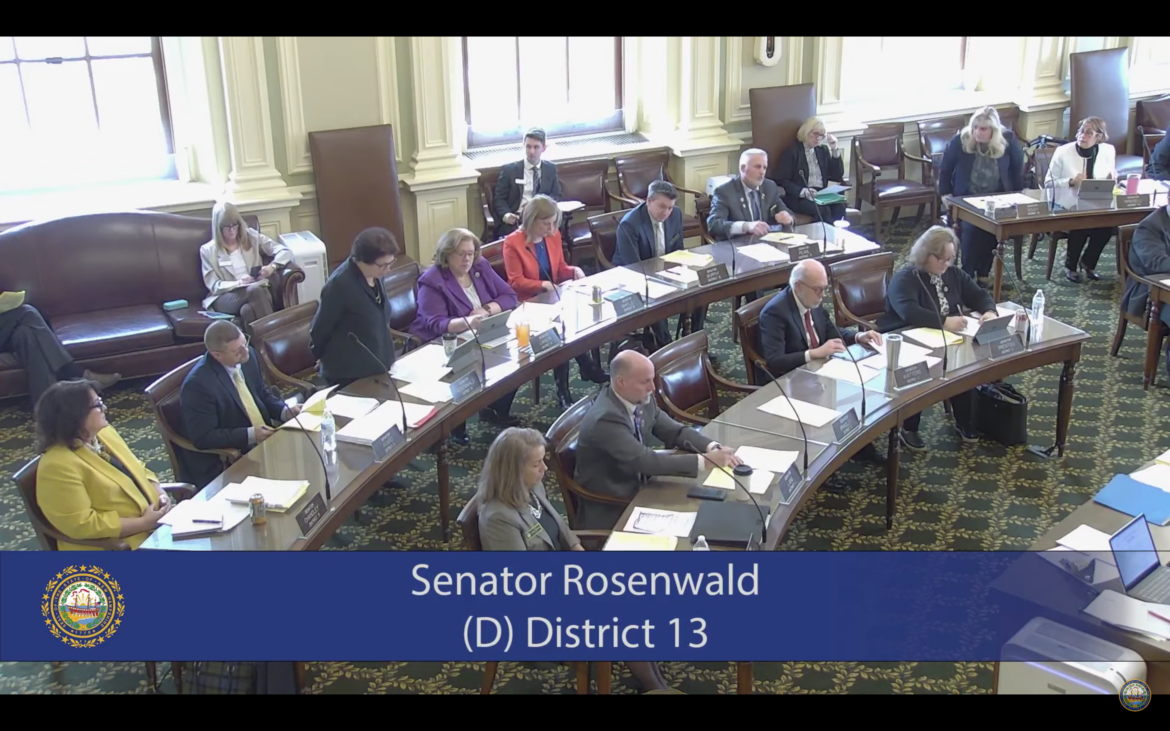By GARRY RAYNO, InDepthNH.org
CONCORD — Cities, towns, school districts and counties could have a little help paying for their employees’ retirement costs.
At Thursday’s Senate session, a bill was approved that would require the state to pay 7.5 percent of the retirement system costs for non-state members of the system.
The current fiscal year budget has a one-time payment of 7.5 percent of the costs, but the Senate refused to make it permanent as the House passed it.
But this session, the Senate approved the state payment that at one time was 35 percent of the costs for cities, towns, school districts and counties, but reduced several times before lawmakers ended the state’s contribution during the great recession about a decade ago.
At Thursday’s session, Senate Bill 114, passed the Senate unanimously. The cost is approximately $27 million to $28 million a year.
State Sen. Cindy Rosenwald, D-Nashua, the prime sponsor, said the bill would permanently codify the state’s responsibility of contributing 7.5 percent to the New Hampshire retirement system for teachers, firefighters and law enforcement.
“Senate Bill 114 will have a meaningful and permanent impact on our municipalities’ budgets, helping to lower the tax burdens for our Granite Staters,” she said. “This is especially important given the fact that our residents are already facing skyrocketing property taxes. I appreciate the support of my Senate colleagues.”
Cities and towns have been pushing the state to at least begin paying some of the retirement system premium as they promised 60 years ago when they began the unified state retirement system.
The bill was tabled by the Senate, which it traditionally does with some of its priority spending bills so it may be inserted into the state budget when the package arrives from the House later this spring.
By tabling the bill, the House does not have an opportunity to change it or kill it, so the Senate is assured it will be in its version of the budget that is negotiated at the end of the session.
Electric Fee
Lawmakers have struggled for years trying to develop a formula that includes an electric vehicle contribution to the state’s Highway Fund, which is largely receipts from the gas tax and auto registrations.
Most attempts have centered around a user fee that would track mileage and have run into privacy issues and opposition from those who say they are doing the right thing by reducing emissions with their electric vehicles and should not be penalized for it.
Thursday with no debate, the Senate initially approved Senate Bill 191, which would impose a $100 yearly surcharge on electric vehicle registration.
Sen. Daniel Innis, R-Bradford, said the original bill set the surcharge at $50 a year, but was increased to $100 to better align with what the average driver would pay in gas tax in a year.
Under the bill, the Department of Transportation can use up to 20 percent of the money collected from the surcharge for electric vehicle service equipment on the state’s highway system.
The bill will go to Senate Finance for review before a final vote is taken on the bill.
Corporal Punishment
The Senate approved Senate Bill 206, which prohibits corporal punishment in child day care agencies. Under the bill, those caught committing corporal punishment would be reported to the licensing board and placed on a registry affecting their ability to do childcare work.
The bill’s prime sponsor, Sen. Sharon Carson, R-Londonderry, said the bill will protect the state’s most vulnerable citizens, its children.
“Previous standards were not keeping children safe, allowing individuals to violate the boundaries of the children within their care,” she said. “With the passage of Senate Bill 206, we will finally end this toxic cycle by closing the loophole, confirming that ‘corporal punishment’ meets the definition of abuse in New Hampshire’s childcare regulations and statutes.”
Energy Networks
The Senate passed several bills expanding who can participate in either net metering or community aggregation projects.
Senate Bill 69 would allow certain non-profits to participate as customer-generator group hosts under net metering.
The bill would allow nonprofit entities of the community and technical colleges, colleges and universities, not-for-profit hospitals, housing authorities, bona fide religious organizations, and the Pease Development Authority, to participate as customer-generator group hosts.
The Senate also passed SB 161, which would allow low-moderate income community solar projects, by changing the net metering law to allow a building for low-to-moderate-income residents that does not have individual metering to be eligible for a community solar project.
Also, Senate Bill 167 to establish a framework for future green hydrogen projects and infrastructure was approved Thursday.
Election Portal
Senate Bill 70, which authorizes the Secretary of State to develop and implement an election and information portal was approved by the Senate.
The portal would allow a person to register to vote, to request an absentee ballot, or change information like party affiliation or address.
The earliest the portal will be available is May 2024.
Overpayment
The Senate also approved Senate Bill 42, which would prohibit the state from collecting interest on an overpayment of unemployment compensation.
The prohibition would not apply if a person “willingly and knowingly” made a false statement to collect the benefit.
Child Seats
The Senate approved Senate Bill 118 which would require a child under the age of two years old to be in a back-facing child restraint seat in a motor vehicle.
The Senate next meets Feb. 14 when Gov. Chris Sununu gives his state budget address to a joint session of the House and Senate.
Garry Rayno may be reached at garry.rayno@yahoo.com.




